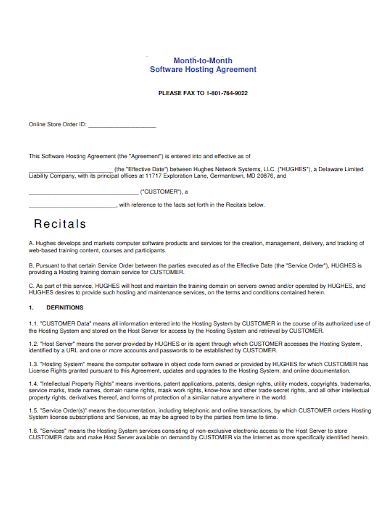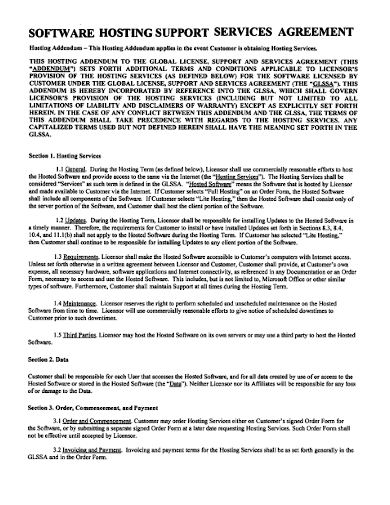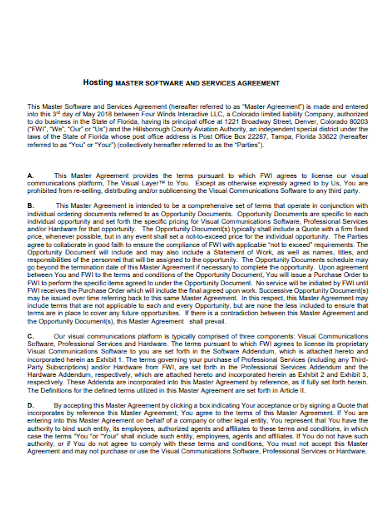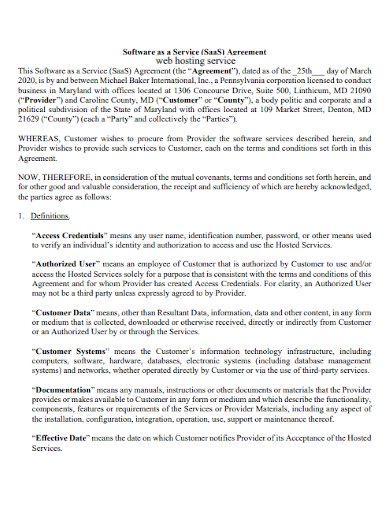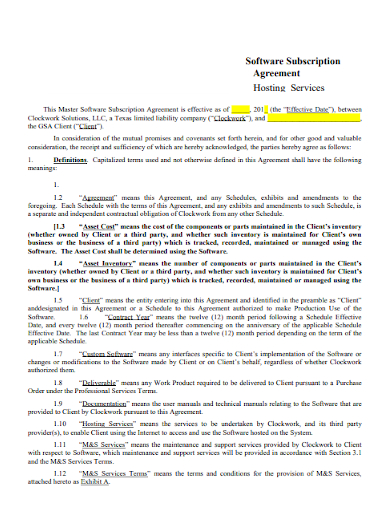In the old days of software, a software company would deliver a stack of floppy disks to a client with an end user license agreement (“EULA”) seal; the client would break the seal, and the license agreement would be accepted. For good measure, there may have been a prompt throughout the installation procedure. The thought of deploying software that largely relied on an internet connection, much less relied on connections, was anathema at the time. True, the software was the physical object being sold, but digital rights management (“DRM”) was still in its infancy, and generating copies of the software was simple. The end user was actually awarded a license to utilize that specific piece of intellectual property.
5+ Software and Hosting Services Agreement Samples
In the legal world, software as a service (SaaS) has particular issues. Specifically, there is a shift away from license-based arrangements and toward technological service agreements. Despite this shift in priority, several aspects of a SaaS agreement still require typical software licensing agreement language. A SaaS contract’s hosted services provision is, at its core, a grant of the user’s ability to access the hosted software, a permit to use the hosted software with all of its limitations, a service level agreement or guarantee of security and availability on the software provider’s part, and the user’s agreement to an acceptable use policy.
1. Software and Hosting Services Agreement Template
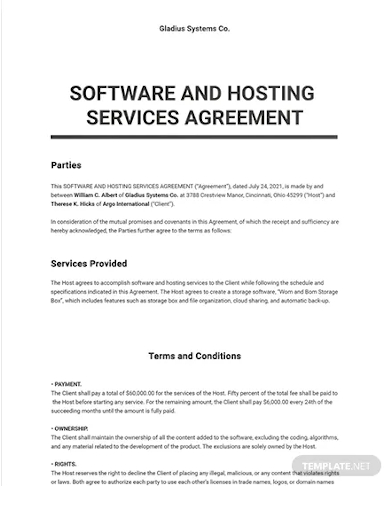
2. Month to Month Software Hosting Services Agreement
3. Software and Hosting Support Services Agreement
4. Hosting Master Software and Services Agreement
5. Web Hosting Software Services Agreement
6. Software Subscription Hosting Services Agreement
Anatomy of Hosted Services Provision
- Grant of access – A license to utilize the hosted software platform without technical instructions and access would be of little use to the end user; omitting this provision would be equivalent to distributing the EULA without disks. When writing, keep the software platform in mind: does it require someone to manually establish a username and password for a new account? Is this done automatically as part of the end user’s contract acceptance process? Specifying the procedure for creating the Account adds clarity to the contract and ensures that all parties understand what to expect and what is required of them.
- Grant of license – A grant of a license to the hosted services is the inverse of a grant of access; the former gives the end user the physical capacity to access the software, while the latter gives them permission to do so. It could be argued that certain SaaS suites do not require the software to be licensed. A software license is only required when the software is copied or duplicated. Thus, even if a SaaS suite has some offline components (that is, it installs anything on the end user’s workstation), a license grant may still be appropriate.
- Scope of the grant of license – If a license for the program is to be issued, great care must be taken to define the scope of the license. Some factors to consider are: 1) Is the license issued only to an individual user, or also to the user’s employees? 2) How many simultaneous connections to the SaaS are allowed? Are there any technological reasons why the total number of users online at any given moment should be limited? 3) Will there be a list of authorized users, as in circumstances when confidentiality is a concern?
FAQs
What is a Service Level Agreement?
The minimal service standards that are guaranteed to the end user are outlined in service level agreements (“SLAs”). In general, these include uptime guarantees (99.9%? ), latency guarantees, and remedies available to end users if these criteria are not fulfilled, as well as what types of force majeure situations exclude all parties from performing. They may also include information about security and privacy, as well as service request timelines.
What is an end-user policy all about?
A description of what is and is not appropriate use for the end user is commonly included in a Hosted Services provision. This frequently entails employing reasonable techniques and taking reasonable steps to safeguard account information, prevent illegal access, and so forth. Depending on the type of software service being considered, the length, complexity, and value of this provision will vary greatly. End users agreeing to solely use the SaaS for the particular uses outlined in the agreement to a simple “reasonable ways” boilerplate language holding the end user responsible for things done on the program using their access credentials.
If you want to see more samples and formats, check out some software and hosting services agreement samples and templates provided in the article for your reference.
Related Posts
FREE 10+ Mentoring Agreement Samples In MS Word | Apple Pages | PDF
FREE 10+ Partner Agreement Samples In MS Word | Google Docs | Apple Pages | PDF
FREE 10+ Individual Agreement Samples In MS Word | Google Docs | Apple Pages | PDF
FREE 10+ Strategic Agreement Samples In MS Word | Google Docs | Apple Pages | PDF
FREE 10+ Equity Agreement Samples In MS Word | Google Docs | Apple Pages | PDF
FREE 10+ Producer Agreement Samples in MS Word | Apple Pages | PDF
FREE 10+ Grant Agreement Samples In MS Word | Apple Pages | PDF
FREE 8+ Meeting Agreement Samples in MS Word | Google Docs | Apple Pages | PDF
FREE 10+ Community Agreement Samples In MS Word | Google Docs | PDF
FREE 8+ Real Estate Option Agreement Samples in MS Word | PDF
FREE 10+ Call Option Agreement Samples In MS Word | PDF
FREE 10+ Advertising Agreement Samples In MS Word | Google Docs | Apple Pages | PDF
FREE 10+ Car Agreement Samples In MS Word | Google Docs | Apple Pages | PDF
FREE 10+ Horse Agreement Samples In MS Word | Apple Pages | PDF
FREE 10+ Option Agreement Samples In MS Word | Google Docs | Apple Pages | PDF

